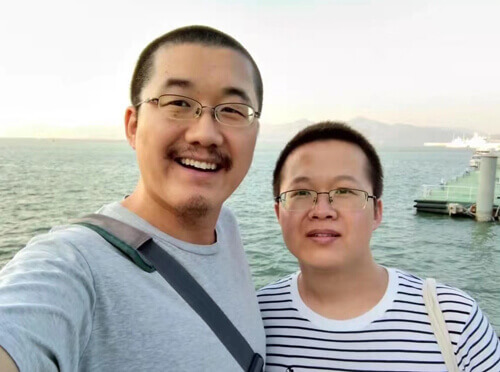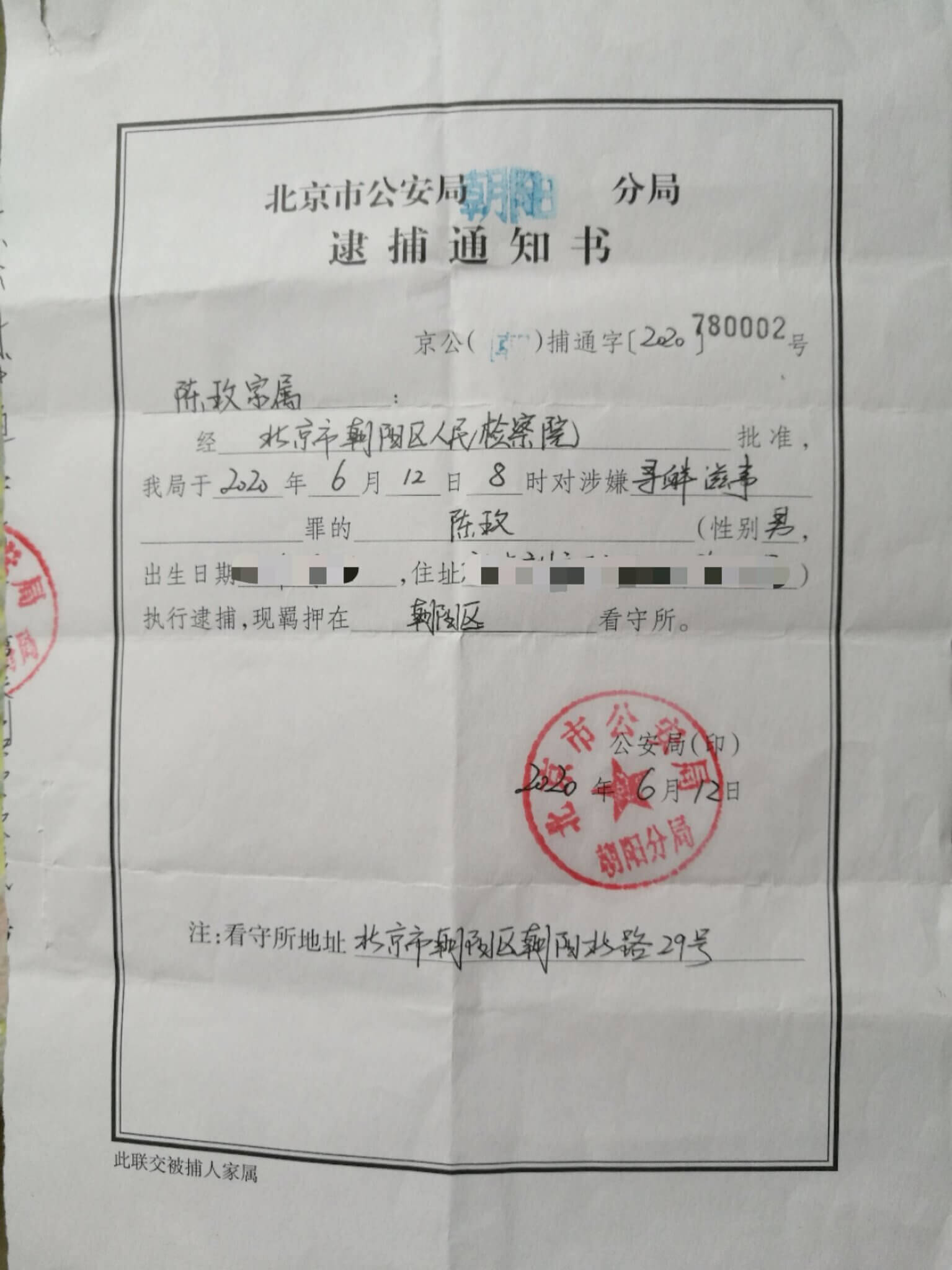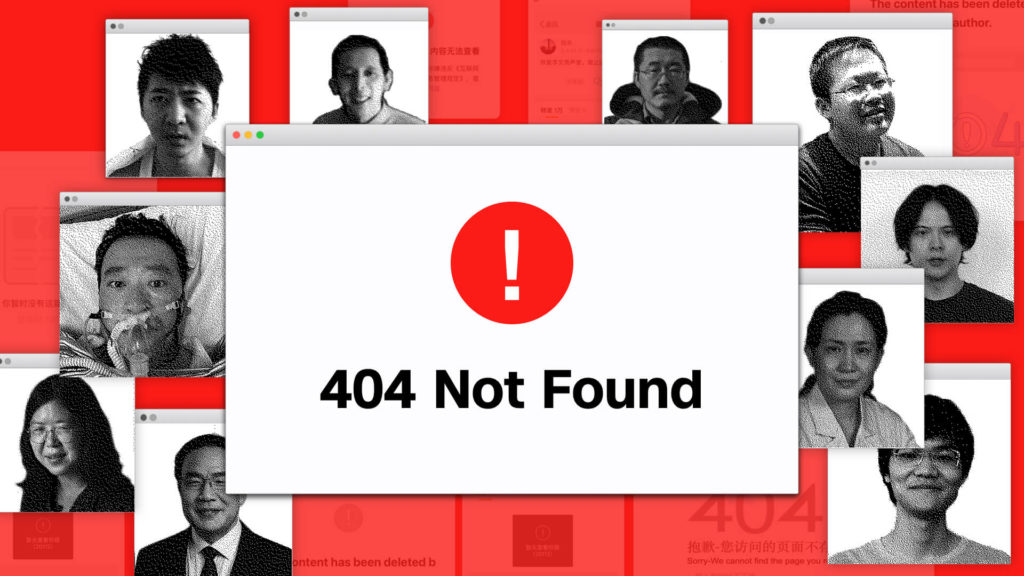Meet the truthtellers
Chen Mei was perhaps an unlikely hero of the coronavirus pandemic.
Chen Mei
- Chen Mei
- What he did
- Archived and republished articles about the early days of the coronavirus on Terminus 2049, including interviews with Ai Fen and Li Wenliang, and a Caixin investigation into the early days of the outbreak.
- What happened
- Detained on April 19, 2020, and charged with “picking quarrels and provoking trouble.” He is still awaiting trial.
A shy but passionate zoology graduate, he worked for a non-profit that helps people with hearing loss, according to his brother Chen Kun. He loved cats and kept a low profile online, said a friend who asked not to be named out of fear of punishment from the authorities.
“He was never the initiator of projects — he always played the supporting role,” said Chen Kun.
But with Terminus 2049 he made an exception.
“You might have to be more cautious about this,” Chen Kun remembers telling his brother, reminding Chen Mei that if he could see his posts about Terminus 2049, then others could, too.
Even so, Chen Kun didn’t think his brother would be arrested as what he was doing was relatively conservative compared to other activists. But under China’s system of information control, the rules are always shifting.
Chen Qiushi
Source: Chen Qiushi/YouTube
- Chen Qiushi
- What he found
- Reported in late January that Wuhan hospitals and doctors were overworked and lacking in supplies.
- What happened
- Mother previously said he had been forcibly quarantined. Believed to be in Qingdao, China. Chen Qiushi’s friend Xu Xiaodong, a famous mixed martial arts fighter in China, said in a YouTube video that Chen had not been charged and was safe and healthy, but was living under state supervision.
Fang Bin
- Fang Bin
- What he found
- Documented body bags piling up outside a Wuhan hospital.
- What happened
- Went missing after posting a video on February 9, 2020. Has not been heard from since, location unknown. Believed to be detained.
Li Zehua
- Li Zehua
- What he found
- Disguised himself as an applicant hoping to work at a Wuhan crematorium and spoke with the recruiter about what would be expected of him so that he could gather evidence of how many people had died. Revealed how state security was trying to silence citizen journalists like him.
- What happened
- Posted video on February 26, 2020 where he said he was being chased by state security before going missing. In April, he published a video saying that he had been put into forced quarantine, and released hidden camera footage that he said showed police coming into his room and taking him away.
Zhang Zhan
- Zhang Zhan
- What she found
- Documented harsh realities of Wuhan life between early February 2020 to mid-May, including overflowing hospitals and empty shops.
- What happened
- Sentenced to four years in prison for “picking quarrels and provoking trouble.”
Cai Wei
Provided to CNN by Chen Kun
- Cai Wei
- What he did
- Archived and republished articles about the early days of the coronavirus on Terminus 2049, including interviews with Ai Fen and Li Wenliang, and an investigation by Chinese media outlet Caixin into the early days of the outbreak.
- What happened
- Charged with “picking quarrels and provoking trouble.” He is still awaiting trial.
Ai Fen
Source: Wuhan Central Hospital
- Ai Fen
- What she did
- One of the first doctors to attempt to raise the alarm on the spread of a new coronavirus in December 2019; her interview with Chinese media prompted an online movement to fight against government censorship. Ai would later become known as the “whistle-giver.” As she told media, she wasn’t the whistleblower, just the one who provided the whistle.
- What happened
- Interviewed by the Disciplinary Committee of her hospital and accused of spreading rumors. No known punishment, appears to still be working as a doctor in Wuhan.
Li Wenliang
- Li Wenliang
- What he did
- Alerted fellow doctors about the new SARS-like virus spreading in December 2019, gave media interviews on the early days of the pandemic in January.
- What happened
- Called to a Wuhan police station on January 3, 2020, where he was reprimanded for spreading rumors on the internet, and told to sign a statement acknowledging his misdemeanor. Tested positive for coronavirus on February 1, 2020, and died on February 7, 2020, from coronavirus.
Zhang Yongzhen
- Zhang Yongzhen
- What he did
- His team sequenced the genome, and were the first to release it publicly. The Chinese government released the genome the following day.
- What happened
- His lab was temporarily closed ‘for rectification’ the day after he published the genome sequence information. He is still working to trace the origin of the coronavirus.
It’s not always immediately clear where the red line is for censorship, and because the rules aren’t static, some people venture into gray areas in the belief that what they are doing will be tolerated by the government. They hope that they will be lucky enough to avoid censorship and potential punishment.
“It’s really unclear what is legal and what is illegal,” a friend of Chen Mei noted. “Why would archiving those articles be illegal?”
When Chen Kun got that fateful call on April 20 from his brother’s boss, he was in Indonesia, trying to avoid the pandemic. His brother Chen Mei had disappeared alongside Terminus 2049 co-founder, Cai Wei, and Cai Wei’s girlfriend, he soon learned.

Chen Kun and Chen Mei.
A few days later, Cai Wei’s family received a phone call from the police, telling them Cai Wei had been arrested and was under residential surveillance at an undisclosed location. He was suspected of picking quarrels and provoking trouble — a charge commonly used to arrest activists in China. Those charges related to two things: building a website on a foreign server, and publishing inappropriate remarks online, Cai Wei’s father Cai Jianli said. That same day, Chen Mei called his boss and told him he would be out sick for a month.
At the beginning of May, Chen Mei’s parents received a notice via courier from police which confirmed their suspicions: their son was under residential surveillance at a designated location, a system whereby people can be held for up to six months without charge.
China’s Ministry of Foreign Affairs and State Council Information Office have not responded to requests for comment on case statuses of Cai Wei and Chen Mei, and fellow truthtellers Chen Qiushi and Fang Bin. They did not confirm how many people had been detained or prosecuted for sharing information on the pandemic. China’s Cyber Security Administration has not responded to a request for comment on whether archiving and republishing Chinese news reports is illegal.

This is the arrest warrant for Chen Mei issued by Beijing Public Security Bureau on June 12, 2020.
Provided to CNN by Chen Kun
Since September, Chen Kun has been living in self-imposed exile in Paris, where he is studying. He believes it is dangerous to return to China, as he has been vocal online about his brother’s disappearance.
Chen Kun had already spent time in detention in Beijing back in 2014. He said he was arrested after his girlfriend put up posters in the city supporting Hong Kong’s pro-democracy Umbrella Movement. Authorities believed he ordered her to do it.
“It wasn’t my plan to study in Paris,” he said. “I would have gone back to China after the pandemic if it weren’t for my brother.”
He worries for his family left in China, including his mother, who the Chinese authorities have contacted to ask about Chen Mei’s political activities, although she knew nothing.
“I’m worried, but I don’t have any choice. I just have one option which is to speak out,” Chen Kun says.
Chen Kun says if people can only see the “whitewashed” version of history promoted by the Chinese government, there will be no way to learn from this current outbreak.
“Then what was the sacrifice of this year for?” he says.
You may also like
-
Afghanistan: Civilian casualties hit record high amid US withdrawal, UN says
-
How Taiwan is trying to defend against a cyber ‘World War III’
-
Pandemic travel news this week: Quarantine escapes and airplane disguises
-
Why would anyone trust Brexit Britain again?
-
Black fungus: A second crisis is killing survivors of India’s worst Covid wave

